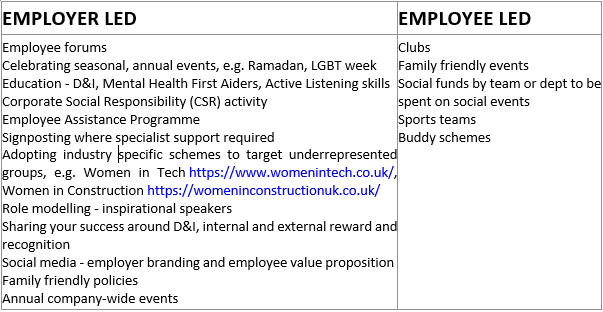Be Kind - Article by Rachel Rowe Chartered MCIPD
In 2019 I stepped away from a blended operational and strategic role and purposely chose to return to a role that allowed me to focus on senior HR recruitment. The shift in focus allowed me time to reflect on the responsibility that sits with HR professionals around topics such as company culture and Diversity and Inclusion (D&I). HR professionals take on this responsibility willingly and work hard to create meaningful people strategy and keep the key themes alive in the business.
allowed me to focus on senior HR recruitment. The shift in focus allowed me time to reflect on the responsibility that sits with HR professionals around topics such as company culture and Diversity and Inclusion (D&I). HR professionals take on this responsibility willingly and work hard to create meaningful people strategy and keep the key themes alive in the business.
Employment Law and current case law support the policies we carefully write to steer senior leaders, line managers and employees along the right path. In 2010 a new Act was introduced to provide a legal framework to protect the rights of individuals and advance equality of opportunity for all. The Equality Act brought together over 116 separate pieces of legislation into one Act. The nine main pieces of legislation that merged were:
- the Equal Pay Act 1970
- the Sex Discrimination Act 1975
- the Race Relations Act 1976
- the Disability Discrimination Act 1995
- the Employment Equality (Religion or Belief) Regulations 2003
- the Employment Equality (Sexual Orientation) Regulations 2003
- the Employment Equality (Age) Regulations 2006
- the Equality Act 2006, Part 2
- the Equality Act (Sexual Orientation) Regulations 2007
Together in one Act, it provides Britain with discrimination law which protects individuals from unfair treatment and promotes a fair and more equal society.
 The Equality Act also introduced ‘Protected Characteristics’ and as such, it is against the law to discriminate against someone because of: age, disability, age, gender reassignment, marriage and civil partnership, pregnancy and maternity, race, religion or belief, sex, sexual orientation.
The Equality Act also introduced ‘Protected Characteristics’ and as such, it is against the law to discriminate against someone because of: age, disability, age, gender reassignment, marriage and civil partnership, pregnancy and maternity, race, religion or belief, sex, sexual orientation.
Protected characteristics have been in the press (Spring 2020) based on the case against League Against Cruel Sports, where the employment tribunal upheld that ethical veganism is a protected characteristic under UK discrimination law (in the context of belief).
I felt compelled to write this blog because managing this ‘responsibility’ can be challenging – and can keep you awake at night as a HR professional! You cannot be everywhere in the business all of the time to listen in on every conversation to be sure any employee – regardless of pay scale or job title – is communicating in a way that is considered to be ethical and in keeping with D&I strategy. The Protected characteristics are sometimes clearly evident and other times (clearly) hidden. Let me share an instance that highlighted this for me last year.
Having started a new role I had been through a company induction, shadowed peers and studied the new ways of working. I was really starting to feel more comfortable in my new surroundings and felt I had started to get to know my colleagues; I had been able to find some common areas of interest – being a parent, dogs, running, baking (nothing extraordinary here). Only during a lunch break with a colleague did we both realise that we had protected characteristics that we hadn’t previously been aware of, because they were hidden. Religion and sexual orientation entered the conversation and it was an enlightening conversation that left us both with a new level of respect for the other. Nothing exceptional about this scenario – similar conversations have probably happened all around the world in the last 5 minutes, but it reminded me of the need to mindful of others differences and to ‘Be Kind’. 
This conversation led me to think about how company strategy can be developed to increase tolerance but also curiosity around differences, and then the parallels to parenting. As the parent of a child with additional needs, I was encouraged to explore a parenting model called PACE (Kim S. Golding and Daniel A. Hughes (2012), Creating Loving Attachments, Jessica Kingsley Publishers). This is presented as a therapeutic approach to parenting. But it is more than this. It is also a way of ‘relating to others’. Through Playfulness, Acceptance, Curiosity and Empathy. I have summarised the model below with some adaptations to suit a work environment – the most notable being the exclusion of playfulness. This is not intended to dismiss the benefit of play, fun, humour in the workplace which is an essential ingredient in the recipe for employee engagement. However, given this article is intended to be focused on D&I I will park [play] for the moment – perhaps there will be a sequel!
(P)ACE
ACCEPTANCE creates psychological safety. This focuses on the acceptance of internal experiences – thoughts, feelings, wishes, beliefs, desires, and hopes that we as human beings carry inside. This is [you] accepting the internal experience of another, communicating your understanding, being comfortable with the knowledge and not disregarding nor challenging the experience of others.
For anyone who has seen The Greatest Showman (2017). Directed by Michael Gracey, 20th Century Fox, think of the safe environment P.T Barnam (Hugh Jackman’s character) creates and the strength of feeling in the song ‘This is Me’.
CURIOSITY is directly connected to understanding. When we curiously explore within a relationship, we are expressing interest in the other (party). This in-turn encourages the individual to be more responsive and share a little more of themselves – their experiences, their hopes and fears. This may come imminently (perhaps the person you are speaking to may have had a bad day) or it may come in time, as the individual becomes more open to the relationship. From experience, they know you are approachable and will listen.
I am by nature a curious person (perhaps this is why I enjoy the recruitment process so much – as you get to interview some really interesting people!) but I have learnt along the way that having an affiliation doesn’t necessarily mean you know all the answers. By way of example, having faith doesn’t necessarily mean you understand (or appreciate) all faiths and beliefs.
EMPATHY communicates our curiosity and acceptance. This is the moment you ‘stand in somebody else’s shoes’ and recognise and respond to their emotional experience. This appreciation of the challenges of others can often be the springboard to further exploration of the past experience – whether positive or negative.
 The (P)ACE model does not work in isolation and as parents we are also expected to manage behaviour and to teach our children what is acceptable and what is not. The boundaries and limits we provide give safety to the children until they are ready to place their own boundaries and limits on themselves.
The (P)ACE model does not work in isolation and as parents we are also expected to manage behaviour and to teach our children what is acceptable and what is not. The boundaries and limits we provide give safety to the children until they are ready to place their own boundaries and limits on themselves.
So what can we learn from this model and adopt as we develop a meaningful strategy to support D&I in the workplace? Having worked in both an SME and a global organisation I have drawn on the examples I have seen in practice as a means of sharing ideas to explore. This is not an exhaustive list so please feel free to add comments and ideas to inspire others. I have grouped the suggestions as either being Employer led or Employee led, but you are likely to find there is some cross-over.
My over-riding desire is to encourage people to be more human and to ‘be kind’ so I hope this resonates – particularly at this time (Autumn 2020). Thanks for reading.I hope you find the lists above helpful. I would love to hear your thoughts and suggestions to inspire others.
Rachel is an experie nced HR/Recruitment specialist with 17 years experience in operational and strategic roles, across multiple sectors, SMEs and global organisations. Throughout her career, Rachel has been passionate about recruitment and with the benefit of experience as a client and candidate Rachel is delighted to be back in a recruitment setting, focusing on linking Ashley Kate clients with outstanding senior candidates.
nced HR/Recruitment specialist with 17 years experience in operational and strategic roles, across multiple sectors, SMEs and global organisations. Throughout her career, Rachel has been passionate about recruitment and with the benefit of experience as a client and candidate Rachel is delighted to be back in a recruitment setting, focusing on linking Ashley Kate clients with outstanding senior candidates.





